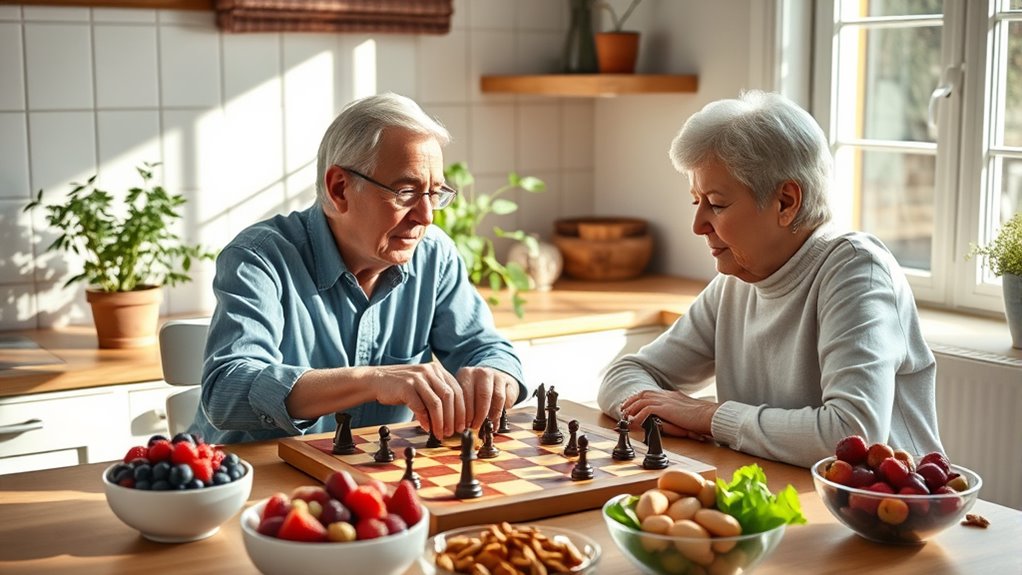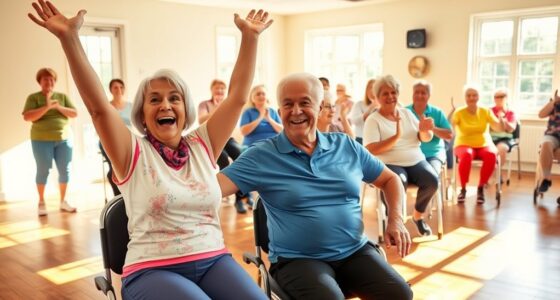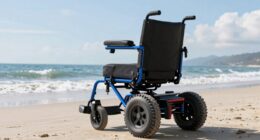Engaging in brain fitness exercises can really sharpen your mind as you age. Try puzzles like Sudoku and crosswords to boost problem-solving skills, or learn a new language for memory enhancement. Music and arts activities not only promote relaxation but also stimulate cognitive function. Plus, regular socialization keeps you emotionally connected and mentally agile. Incorporating these activities into your routine can greatly improve your cognitive health, and there’s more valuable information to explore on this topic.
Key Takeaways
- Engaging in puzzles like Sudoku and crosswords can significantly boost memory retention and problem-solving skills in seniors.
- Learning a new language enhances cognitive function and delays mental decline by improving memory and visual-spatial skills.
- Participating in group activities, such as board games, fosters social interaction and stimulates cognitive engagement, reducing feelings of isolation.
- Creative pursuits like painting and music therapy activate various cognitive systems, promoting emotional expression and improving overall brain health.
- Regular physical activity, such as walking or tai chi, enhances endurance and flexibility while contributing to better mental health and cognitive function.
Benefits of Brain Exercises for Seniors

As you age, staying mentally sharp becomes increasingly important, and engaging in brain exercises offers significant benefits.
Regular mental stimulation can reduce the risk of cognitive decline by up to 30-50% in seniors. Activities like puzzles and memory games not only improve memory but also enhance mental acuity and problem-solving abilities.
Regular mental exercises, like puzzles and memory games, can significantly reduce cognitive decline risk in seniors by enhancing memory and problem-solving skills.
Learning new skills, such as playing an instrument, promotes neuroplasticity, creating new neural pathways that bolster cognitive function.
Plus, social engagement through group exercises fosters emotional support, combating loneliness and boosting mental health.
By consistently participating in brain fitness activities, you can experience a noticeable improvement in cognitive function, with seniors often seeing up to a 20% increase in their abilities.
Stay sharp and engaged!
Fun Brain Exercises to Enhance Cognitive Function

Engaging in fun brain exercises is a fantastic way to enhance cognitive function and keep your mind sharp.
You might enjoy solving puzzles like Sudoku and crosswords, which boost problem-solving skills and improve memory retention. Playing card games such as bridge or poker not only fosters social interaction but also hones your strategic thinking and memory. Additionally, these activities can help improve emotional regulation, essential for maintaining mental health and well-being. Regular participation in such activities can also enhance communication skills, which are crucial for building and maintaining relationships. Engaging in social games can also help you develop stronger support systems that are vital for emotional well-being. Furthermore, maintaining consistent routines in your daily life can further enhance cognitive function.
Consider learning a new language; it enhances memory and visual-spatial skills while delaying mental decline. Activities like dance or tai chi improve coordination and cognitive function, offering both physical fitness and social connections.
Finally, creative pursuits like painting engage multiple cognitive systems, promoting mental engagement and reducing the risk of memory problems. Additionally, transforming your living environment can create a more stimulating atmosphere that encourages a better senior living experience.
Keep your brain active and enjoy these enjoyable exercises!
Engaging in Puzzles and Games for Mental Agility

When you tackle puzzles and games, you stimulate your brain in ways that enhance mental agility and cognitive function. Engaging in these activities can greatly benefit seniors by improving various skills:
- Puzzles like Sudoku and crosswords boost memory retention and problem-solving abilities, while also encouraging regular mental exercise. Additionally, consistent engagement in these activities can lead to improved cognitive performance, which is essential for maintaining mental sharpness. This mental stimulation can also enhance emotional intelligence, aiding in better interpersonal relationships.
- Jigsaw puzzles enhance visual-spatial reasoning and serve as a shield against cognitive aging, potentially countering emotional dysregulation that can arise from stress.
- Card games such as bridge and poker improve memory and strategic thinking, linked to increased brain volume.
- Trivia quizzes offer mental stimulation and foster social interaction, keeping your mind sharp while having fun.
Additionally, playing games can strengthen trust issues with boyfriends, as they encourage teamwork and communication skills.
Incorporating these games into your routine can be an enjoyable way to maintain brain fitness and promote cognitive health.
Embrace the challenge, and enjoy the benefits!
The Role of Music and Arts in Brain Health

In addition to puzzles and games, exploring music and arts can greatly enhance brain health. Engaging in music activities, like playing an instrument or singing, stimulates areas of your brain responsible for auditory processing and motor control, improving cognitive function. Predictive modeling can also be applied to assess how different creative activities impact cognitive performance in seniors. Furthermore, utilizing loops in music production can provide an engaging way for seniors to experiment with sound and creativity. Research suggests that adopting iterative processes in creative endeavors can lead to continuous improvement in cognitive skills as well.
Music therapy not only boosts emotional well-being but also reduces anxiety, promoting relaxation essential for overall brain health. Engaging in creative activities can also enhance your brain’s neural connections, which are crucial for maintaining cognitive function.
Participating in arts and crafts has been linked to a 73% lower risk of memory problems, as these activities engage your brain’s creative and planning aspects. Additionally, listening to classical music can enhance concentration and memory retention.
Embracing creative arts fosters emotional expression and strengthens neural connections, contributing to cognitive resilience and improved mental agility as you age. Moreover, music education’s psychological and cognitive benefits can further support mental sharpness in seniors.
Socialization: A Key Component of Cognitive Engagement

Socialization is crucial for keeping your mind sharp as you age. Engaging in group activities boosts your communication skills and provides emotional support, which are essential for staying mentally agile. Additionally, cultivating strong communication skills can enhance your relationships and further stimulate cognitive engagement. Studies show that emotional expression can also play a significant role in maintaining mental health, especially in older adults. Incorporating humor into communication, such as through seniors texting humor, can foster connections and alleviate feelings of isolation. Furthermore, regular social interaction can help reduce anxiety and depression symptoms, promoting overall cognitive health. Creating a supportive community at home can further enhance these social interactions, making it easier for seniors to engage with others.
Benefits of Social Interaction
While many factors contribute to cognitive health, engaging in social activities stands out as an important component.
Social interaction isn’t just about companionship; it’s crucial for your brain. Here are some key benefits:
- Reduces cognitive decline and lowers the risk of dementia by up to 70%.
- Enhances emotional well-being, promoting feelings of belonging and support. Engaging with others can also foster emotional alignment, which is essential for maintaining healthy relationships.
- Improves memory retention and recall, helping you stay sharp.
- Boosts problem-solving skills through engaging discussions and teamwork.
- Engaging in social activities can also foster open communication, which is essential for resolving conflicts and strengthening relationships.
Group Activities and Engagement
Engaging in group activities can considerably enhance your cognitive abilities and create meaningful connections. Participating in social activities helps reduce feelings of isolation and promotes cognitive engagement. Group activities, like board games or community initiatives, stimulate your mind through collaborative problem-solving and boost memory retention. Regular social interactions are linked to better cognitive function and a lower risk of cognitive decline.
Here’s a quick overview of benefits:
| Benefits | Activities | Impact |
|---|---|---|
| Enhance Cognitive Skills | Board Games | Improves Memory Retention |
| Foster Emotional Well-Being | Volunteering | Provides Sense of Purpose |
| Promote Neuroplasticity | Community Events | Helps Brain Adaptation |
Nutrition and Lifestyle Changes for Optimal Brain Health

To boost your brain health, you’ll want to focus on brain-boosting foods, establish healthy sleep habits, and engage in regular physical activity.
Eating a diet rich in fruits, vegetables, and omega-3s can make a real difference.
Plus, staying active and getting enough sleep are essential for keeping your mind sharp.
Brain-Boosting Foods
Eating the right foods can greatly boost your brain health as you age. Incorporating brain-boosting foods into your diet can enhance cognitive function and protect against cognitive decline.
Focus on these key nutrients:
- Omega-3 fatty acids from fatty fish, walnuts, and flaxseeds to improve memory.
- Antioxidants found in berries, dark chocolate, and leafy greens to combat oxidative stress.
- Turmeric, rich in curcumin, to support brain health and promote new brain cell growth.
- Follow the Mediterranean diet with whole grains, fruits, and vegetables for overall brain wellness.
Don’t forget about hydration! Drinking enough water is essential for ideal brain function, so keep your fluids up to stay sharp and focused.
Healthy Sleep Habits
While you may focus on diet to boost brain health, don’t overlook the essential role of quality sleep. Healthy sleep habits are vital for cognitive function and memory consolidation.
Aim for 7-9 hours of rest each night by establishing a consistent sleep schedule—going to bed and waking up at the same time daily helps regulate your internal clock and enhances sleep quality.
Limit exposure to screens and blue light before bedtime; they can disrupt melatonin production. Incorporate relaxation techniques like mindfulness meditation or deep-breathing exercises to reduce stress and promote better sleep.
Finally, maintain a balanced diet rich in antioxidants and omega-3 fatty acids while avoiding heavy meals and caffeine close to bedtime for ideal brain health.
Regular Physical Activity
Quality sleep sets the foundation for your brain’s health, but regular physical activity is essential for keeping it sharp as you age. Engaging in exercise not only boosts blood flow to your brain but also enhances cognitive function and memory.
Aim for at least 150 minutes of light-to-moderate activity weekly. Consider these activities:
- Walking or swimming to improve endurance
- Tai chi for balance and flexibility
- Group classes to promote social engagement
- Mindful exercises to reduce stress
These lifestyle changes contribute greatly to overall well-being in seniors.
Frequently Asked Questions
How Do You Sharpen Your Mind as You Get Older?
As you get older, sharpening your mind is essential. You can challenge yourself with puzzles like Sudoku or crosswords to enhance your cognitive flexibility.
Learning new skills, such as an instrument or a language, keeps your brain active. Don’t forget to socialize; group activities boost emotional connections and cognitive abilities.
Incorporate physical exercise, like walking, and practice mindfulness through meditation to reduce stress and improve focus. These habits can help maintain your mental sharpness.
What Is the Number One Brain Exercise for Memory Improvement?
The number one brain exercise for memory improvement is engaging in crossword puzzles.
You’ll find that regularly tackling these challenges enhances your vocabulary and critical thinking skills, which directly boosts memory retention. As you work through clues, your brain actively processes information, strengthening neural connections.
This enjoyable activity not only sharpens your mind but also keeps it agile as you age. So, grab a pencil and plunge into a crossword puzzle today!
What Is the Best Brain Booster for Seniors?
You might think that simply solving puzzles is the best brain booster for seniors, but it’s more multifaceted.
Engaging in creative activities like painting or crafts, learning a new language, and participating in social games can greatly enhance cognitive abilities.
These activities stimulate neuroplasticity, improve memory retention, and foster social connections.
What Are Good Brain Activities for Seniors?
If you’re looking for good brain activities, try engaging in puzzles like crosswords and Sudoku.
Learning a new skill, such as playing an instrument or crafting, can also stimulate your brain.
Don’t forget about social activities; joining group games or community events helps keep your mind active and connected.
Regular physical exercise, like walking or tai chi, boosts blood flow to your brain, enhancing cognitive function.
Brain training apps can offer fun challenges too!
Conclusion
Incorporating brain exercises into your daily routine can be like watering a garden; with the right care, your mind will blossom. From puzzles and music to socializing and proper nutrition, each activity cultivates your cognitive health. Embrace these enjoyable practices, and watch your mental agility flourish. Remember, staying mentally active not only sharpens your mind but also enriches your life, ensuring you continue to thrive at every stage of your journey. Keep nurturing that vibrant brain!









